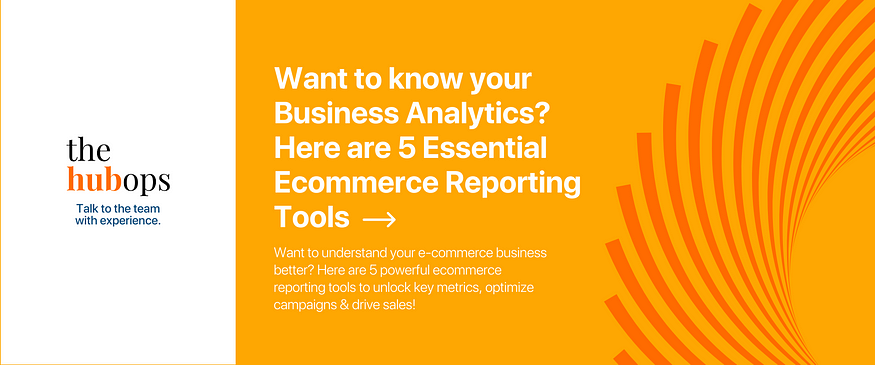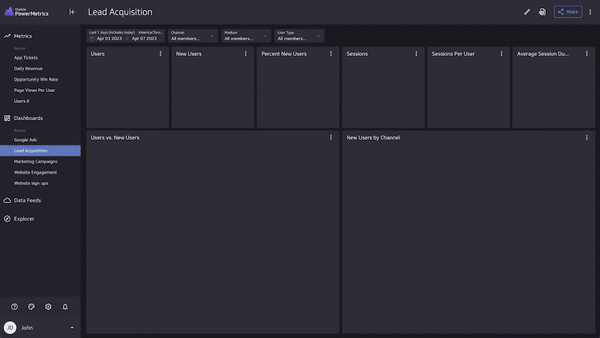Want to know your Business Analytics? Here are 5 Essential Ecommerce Reporting Tools

The e-commerce landscape is booming, fueled by a surge of e-commerce investors and a dramatic shift in consumer behavior towards online shopping. Scalability is a key challenge in e-commerce — being able to handle growth without compromising performance is crucial.
However, success in this digital marketplace goes beyond just a great product. Businesses need to be data-driven to optimize operations and maximize profits. This is where e-commerce reporting tools come in.
E-commerce reporting tools empower businesses to gather, analyze, and visualize data from various sources, including website traffic, customer interactions, and sales transactions. By leveraging these insights, businesses can:
- Optimize marketing campaigns to reach the target audience and drive targeted conversions.
- Improve customer experiences by understanding their behavior and preferences.
- Identify areas for improvement across various aspects of their e-commerce operations.
- Make data-driven decisions to ensure long-term growth and success.
Given the plethora of options available, choosing the right ecommerce reporting tool can be overwhelming. This blog explores five of the most popular tools, providing a concise overview of their functionalities to help you select the best fit for your needs:
1. Google Analytics: Free Insights Powerhouse
Google Analytics, a free ecommerce reporting tool by Google, offers a comprehensive overview of website traffic and user behavior. It allows you to track key metrics like website visits, page views, bounce rates, and conversion rates.
Benefits:
- Optimize website content and user experience based on user behavior.
- Identify marketing campaigns driving the most traffic and conversions.
- Gain insights into customer demographics to personalize marketing efforts.
- Integrate with other Google products like Google Ads for a unified marketing strategy (See our blog on Optimizing Google Ads for E-commerce Success).
2. Shopify Analytics: Built-in Insights for Shopify Stores
Shopify, a leading e-commerce platform, offers built-in analytics specifically tailored to Shopify stores. While not a standalone tool, Shopify Analytics provides valuable insights directly within your Shopify dashboard, simplifying e-commerce account management.
Benefits:
- Seamless integration with the existing Shopify platform for a unified view of your store.
- Actionable insights tailored to Shopify store functionalities.
- Simplify data analysis with pre-built reports and dashboards.
3. Looker Studio (formerly Google Data Studio): Data Visualization Made Easy
Looker Studio (formerly Google Data Studio) isn’t strictly an e-commerce reporting tool. However, it excels at data visualization, allowing you to transform raw data from various sources into compelling reports and dashboards.
Benefits:
- Create visually stunning reports for communicating data insights to stakeholders and for crafting data-driven content for your ecommerce newsletter.
- Gain a clear and concise overview of key e-commerce metrics through interactive dashboards.
- Identify trends and patterns by visually analyzing data.

4. Databox: Centralize All Your E-commerce Data
Databox is an e-commerce reporting tool designed to centralize data from various sources, including Google Analytics, Shopify, Facebook Ads, and email marketing platforms. This consolidated view allows for a more holistic understanding of your e-commerce performance.
Benefits (for B2B E-commerce):
- Gain insights into customer behavior and buying patterns in the business-to-business (B2B) e-commerce space, which can differ significantly from B2C e-commerce.
- Track key performance indicators (KPIs) relevant to B2B e-commerce, such as average order value and customer lifetime value.
- Monitor sales performance across different product categories and customer segments within the B2B e-commerce landscape.
5. Klipfolio: User-Friendly Interface and Collaboration Features
Klipfolio is another popular e-commerce reporting tool known for its user-friendly interface and robust collaboration features. It allows teams to create, share, and discuss data insights in real-time.
Benefits:
- Empower teams to collaborate effectively on data analysis and decision-making.
- Simplify complex data for non-technical users through intuitive visualizations.
- Create custom dashboards tailored to specific needs and roles within your e-commerce team.


Comments
Post a Comment